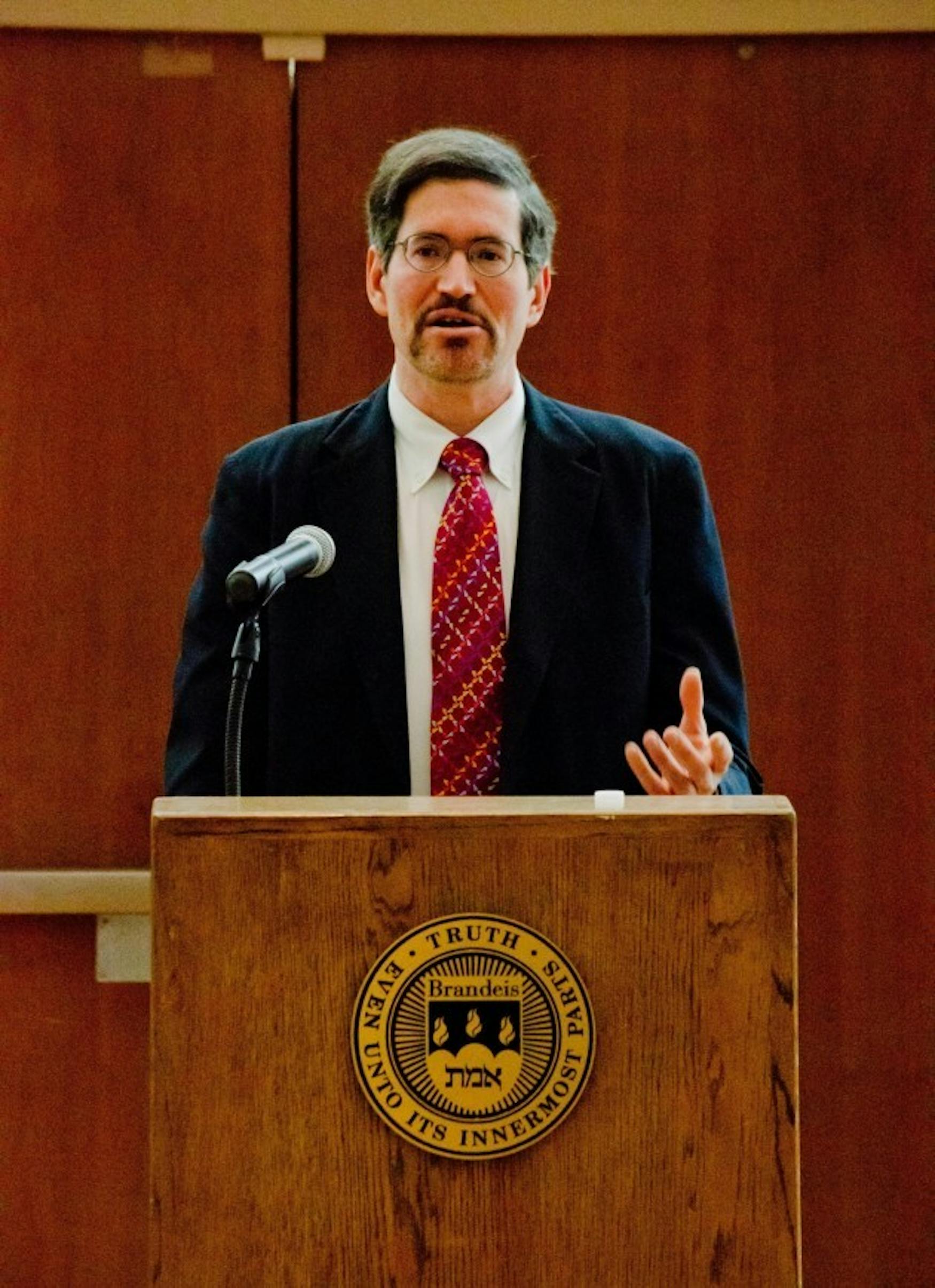Klarman lectures on gay marriage and political backlash
On Thursday, Michael J. Klarman, Kirkland and Ellis Professor at Harvard Law School, gave the History Department's Rahv, Hughes, Manuel and Marcuse Memorial Lecture in the Rapaporte Treasure Hall. The well-attended lecture, titled "Same-Sex Marriage Litigation and Political Backlash," was a preview of Klarman's new book about same-sex marriage litigation.
Prof. Michael Willrich (HIST) introduced Klarman, briefly discussing Klarman's research on Brown v. Board of Education, Klarman's achievements in the academic world and his new book "From the Closet to the Altar Courts, Backlash, and the Struggle for Same-Sex Marriage." Klarman used examples and comparisons from the decision and aftermath of Brown v. Board of Ed. as support for many of his points throughout the lecture.
Klarman began his speech by talking about several case studies related to political backlash.
He then gave some background on same-sex marriage litigation. He said that it seemed inconceivable that same-sex marriage would be constitutionally protected by the courts until around the 1990s, because "it's just not the case that courts can ever get that far apart from predominant public opinion."
Klarman stated that "gay marriage is starting to look pretty much inevitable," adding that favorable public opinion had been rising at the rate of about one percent a year, but has substantially accelerated over the last three years to around three or four percent a year. According to a 2011 New York Times article, 51 percent of Americans who were polled believe same-sex marriages should be legalized. He also referred to New York Times columnist Nate Silver's prediction that at this new rate, half of the states will have a favorable majority opinion on same-sex marriage within the next year or two and that all states will have a favorable majority opinion in about twelve years.
Klarman explained that the rate increase of favorable opinion is attributable to the "coming-out phenomenon," which is when people who come out prompt others to come out by making them more comfortable doing so.
The increase is therefore not simply the transfer of power from an older to a younger generation, as even older citizens are changing their opinions.
Klarman also spoke about political backlash stemming from same-sex marriage litigation. He said that political backlash is more likely to occur when people on the two sides of the issue care about the issue with differing levels of intensity. He used statistics that showed that white Southerners who disagreed with the decision of Brown v. Board of Ed. placed more importance on Civil Rights than white Northerners who agreed with the decision, and the political backlash that occurred after the decision to support this point. He also said that if a policy that is adopted considerably diverges from public opinion, backlash is likely to occur. He elaborated that judges sometimes deviate from public opinion because they reflect the views of a cultural elite and not the masses and thus cannot always gauge how popular or unpopular their decisions will be.
Next, Klarman spoke and assessed the costs and benefits of same-sex marriage litigation. He said that one benefit of same-sex marriage litigation is that it has raised awareness of the issue, and has caused more public discussions to take place. He said it has also aided the same-sex marriage movement by giving activists confidence that change is achievable. Additionally, he said that same-sex couples that got married after favorable court decisions advanced the movement by giving a face to the issue.
On the other hand, Klarman said that litigation has harmed the movement by subtracting resources and attention from other issues on the gay rights movement agenda. He added that by focusing on the most radical part of the agenda, litigation has made other goals harder to achieve. For example, he said that litigation has sometimes made adoption by same-sex couples seem more controversial, because of the large focus on same-sex marriage, the most contentious part of the movement.
He added that the issue has profound effects on the results of some elections. Klarman said that George Bush may have been elected in 2004 because of the same-sex marriage issue. Because of this, whether to litigate should be carefully considered, because drawing attention to the heated issue in this way could slow the progress of the gay rights movement by preventing the election of progressive politicians. He followed this point, posing the hypothetical question "Would you rather have civil unions in Massachusetts and John Kerry as president, or gay marriage in Massachusetts and George Bush as president?"
Klarman ended his lecture with a question-and-answer session.
"I thought it was an interesting take on gay marriage that you don't normally hear, sort of getting not just the social issue of it, but [also] the bigger political and legal aspects of it," said Anna Barbaresi '13, who attended the lecture.




Please note All comments are eligible for publication in The Justice.